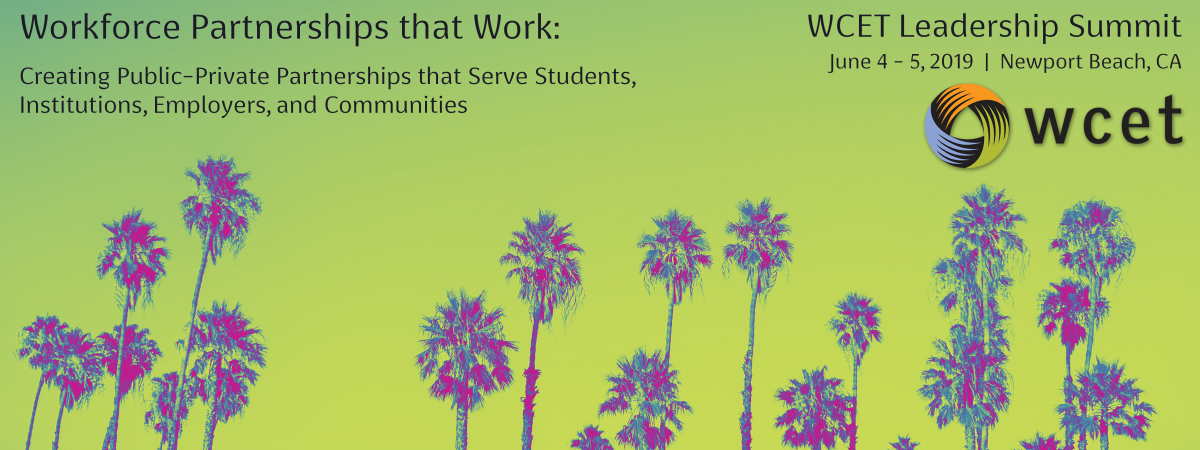Soft Skills: Unlocking the Power of Knowledge
Published by: WCET | 6/3/2019
Tags: WCET, WCET Summit, Workforce/Employment
Published by: WCET | 6/3/2019
Tags: WCET, WCET Summit, Workforce/Employment
This week, WCET is thrilled to convene this year’s Leadership Summit on workforce and higher education partnerships. Attendees at the event will focus on how higher education institutions can work with employers to create programming that can help students be more career ready and skilled for the workforce.

In light of this topic, today we welcome Corina Santoro, the director of the employability initiatives and Cengage Unlimited Centers, who is here to discuss the importance of employabilty skills. Thank you Corina for this wonderful post!
Enjoy the read and enjoy your day!
Lindsey Downs, WCET
If you work in any part of education, you’re likely well aware that people are talking about soft skills—about students lacking them, about employers calling for them, about the challenge of teaching them (and whose responsibility is that anyway), about the best way to assess them, about the essentialness of their nature and the non “softness” of these so called soft skills. Some call these employability skills (I do), some favor 21st Century skills, some argue for the more rigorous ‘core skills’ term. Whatever you call them, the fact remains: talking about these skills is hot!
At least once a week, I see a new article, study or blog post reminding us employability skills are in high demand, giving us , reminding us that soft skills are important (yes) and that employers increasingly claim college graduates don’t have them (sad). A recent article stated that “90% of talent professionals rank these skills as important”. In our own research here at Cengage, 73% of employers cited these skills as missing. The sheer volume of data and interest surrounding this topic signals we’ve reached acceptance, en masse, that soft skills, or the slightly preferred term – employability skills – are needed.
But that’s where we stop.
It’s easier to talk about the problem than fix the problem.
So we bypass the issue by continuing to talk and generate ever-increasing amounts of data supporting the fact that we have a problem.
On the off chance that you need the data recap, here’s the key points you should know.
This is, in my opinion, the true skills gap. Students pursue education to get employed, but they graduate woefully underprepared to succeed in in today’s workplace. They graduate having mastered Chemistry, Accounting, Design or any number of other domains, while lacking the essential career success skills. They graduate without employability skills.
There was a time when the Liberal Arts degree was in high favor. We now live in an age where that degree is frowned upon in lieu of more “useful” degrees. Although there’s been a 29% increase in the number of college degrees awarded in the last 10 years, graduates from programs like Education, English and Philosophy have all dropped by around 20% in that same period.  I propose that we have gotten so hyper-focused on ensuring our students learn useful concepts that we’ve overlooked the fact that this knowledge in a vacuum is inert. No matter what we as human beings learn, if we don’t know how to apply it in the unpredictable real world, we don’t know how to succeed.
I propose that we have gotten so hyper-focused on ensuring our students learn useful concepts that we’ve overlooked the fact that this knowledge in a vacuum is inert. No matter what we as human beings learn, if we don’t know how to apply it in the unpredictable real world, we don’t know how to succeed.
And what empowers us to apply our knowledge? Soft skills! And why is that? Because applying anything we’ve learned in the real world inevitably encounters that ever-changing and highly finicky variable: human beings.
This problem is only going to increase. Like it or not, computers and AI will overtake those mindless and semi-mindless tasks that we have done. A recent study reported that 1/3 of all tasks in 60% of today’s jobs can technically be automated. But that’s not something for us to fear; that’s something we should embrace! Let the computers do the mindless tasks. What computers can’t do is think and feel and creatively respond to new and unknown elements in real time. What computers can’t do is be human! And it’s these uniquely human traits—creative thinking, critical thinking, communication, adaptation and the like—that, when mastered, propel us to success.
I would argue, no. Innovation comes in many forms. Albeit less glamourous, one of those is seeing new ways of connecting existing dots. There are signs this is beginning to happen. For example, Becker College introduced an integrated Academic and Career Advising service, creating the space for conversations that integrate employability skills as part of the entire college experience. “It’s working on a number of levels,” Rich Davino, Executive Director at Becker College Center of Career Education & Advising, said. “We are developing good relationships with students. And with this more personalized approach, we can see a much greater landscape. I can talk to students about classes, internships, whether they might want to study abroad, and career options. These are things that can happen in the same conversation.” Some schools are responding to the market demand for graduates who possess employability skills by re-thinking the liberal arts degree, given its inherent focus on these skills. Yale, for example, will offer a course from an outside organization in software coding this summer and apply it toward an undergraduate degree. In addition, schools are increasingly engaging employees in the trenches at local companies to help re-shape their curricula.
We, at Cengage, have engaged employers to help us define the baseline employability skills required by entry level candidates in all industries. Armed with that market informed knowledge, we are developing solutions to enhance our Cengage Unlimited Career Center that elevate student awareness of these requirements, and prepare students to meet employer expectations, day one on the job.
There are many ways to solve this problem, but one constant remains: Until we stop thinking of employability skills as ancillary and on the side and instead acknowledge that they are the infrastructure that enables the application of knowledge, we’ll never close the skill gap. One might even go so far as to say that in the absence of employability skills, the pursuit of other knowledge is futile.
Knowledge is power when applied. If we don’t know how to use it, what’s the value of knowing it?
I invite you to continue the conversation with our Cengage team THIS WEEK at the WCET Leadership Summit June 4-5 in Newport Beach, CA.

Corina Santoro,
Director,
Employability Initiatives & Cengage Unlimited Centers
Cengage
LinkedIn @Corina Santoro

2 replies on “Soft Skills: Unlocking the Power of Knowledge”
[…] Last spring, I had the opportunity to share some thoughts on soft skills – what they are, why they matter, how they contribute to employability and why the future of work demands them. If you missed that post, you can catch up on the stats in this Frontiers article here. […]
[…] of skills that employers say they are looking for in potential hires. According to a June 2019 WCET Frontiers post on soft skills, only 7% of employers surveyed said they’d hire a candidate who possessed the technical […]